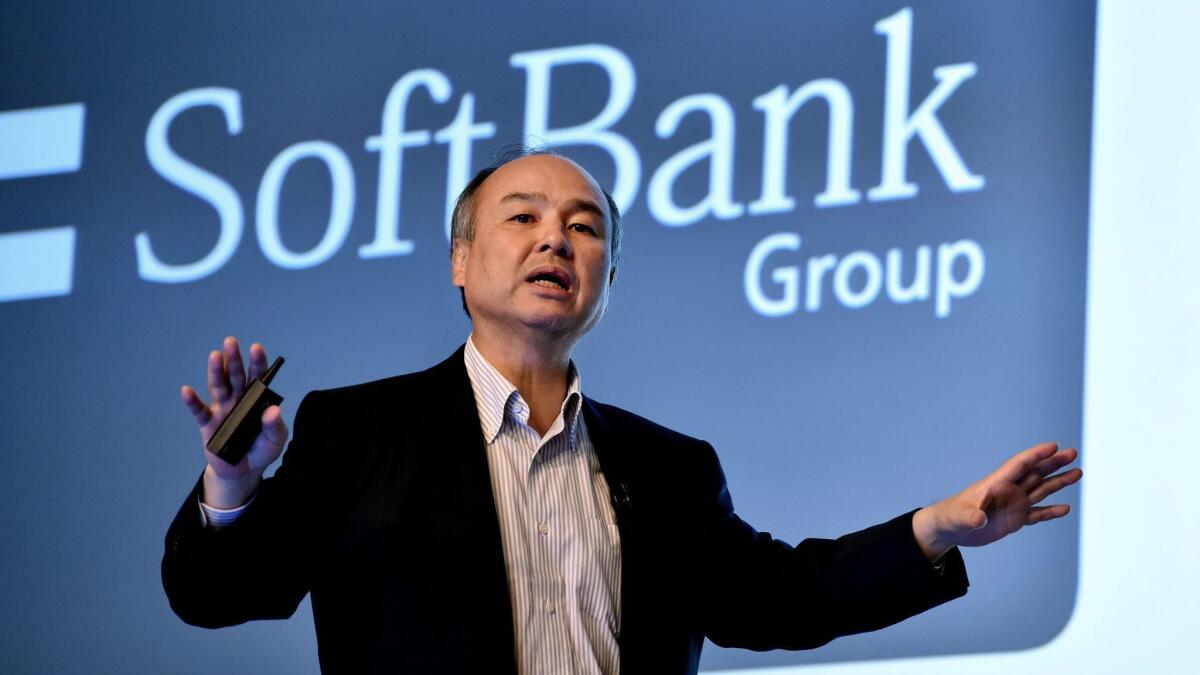WeWork board weighs $9.5-billion takeover bid from SoftBank

- Share via
Adam Neumann, the flamboyant co-founder and ex-chief executive of WeWork, could be stripped of his outsize voting power and chairmanship of the money-losing property company under a $9.5-billion rescue proposal from its largest investor, SoftBank, set to be considered by the board on Tuesday.
Neumann would be left with less than 10% of the shares and voting rights at the company, according to three people briefed on the plan. Marcelo Claure, SoftBank’s chief operating officer, would become chairman.
SoftBank will emerge with between 60% and 80% of WeWork’s equity under the package, which involves $5 billion of new debt, injecting $1.5 billion in equity and an offer to buy up to $3 billion of existing shares.
Neumann’s reduced status under the emergency refinancing caps the striking fall of a self-described visionary who two months ago was hoping to take his company public in one of the hottest stock market debuts of the year. Having previously expected his family to take charge of WeWork far into the future, Neumann will now see his company under the control of SoftBank, the Japanese technology and telecom group founded by Masayoshi Son.
WeWork’s equity valuation will be slashed to roughly $8 billion if the board agrees to the rescue by SoftBank, which had pumped the office space provider’s valuation up to $47 billion with more than $10 billion of earlier investments and funding commitments.
WeWork’s failed initial public offering and a rapidly depleting cash pile have forced it to consider rival rescue packages from SoftBank and JPMorgan Chase, the bank that led its attempt to go public.
The SoftBank proposal being considered late Monday includes bringing forward the $1.5-billion equity injection the Japanese group had previously planned to make in April 2020. SoftBank’s Saudi Arabia-backed Vision Fund, which invested alongside Son’s company in earlier funding rounds, is not expected to contribute to the financing.
WeWork would abandon its dual-class share structure, which at one point gave Neumann 20 times the voting power of other shareholders, under the SoftBank proposal, according to the three people briefed. Those voting rights, as well as a series of deals Neumann conducted with the company, emerged as a major source of concern for investors when the group was preparing for its IPO.
Neumann currently controls an economic stake of just over 20% in an investment vehicle with his co-founder, Miguel McKelvey. Those voting rights were cut to three times those of ordinary shares when Neumann was ousted as chief executive last month.
The rescue deal also involves a tender of up to $3 billion for shares held by WeWork’s existing shareholders, including Neumann, who would agree to sell part of his holding to Son’s group, one of the people said.
JPMorgan has been pitching its own $5-billion funding package over the last two weeks and has met roughly 100 institutional investors it hoped would finance the borrowing. The proposal from the Wall Street lender was set to include roughly $2 billion in unsecured debt, structured as payment-in-kind notes that carried a coupon of 15%.
The debt in the SoftBank proposal would be on better terms than the debt financing cobbled together by JPMorgan, one person briefed on the rival offers said.
The two offers are set to be formally submitted to the board Monday, and directors are expected to meet Tuesday to decide which proposal to take. The company faces a cash crunch by the end of November if it does not secure an injection of new money.
The price of the company’s bonds rallied Monday, rising from just over 84 cents on the dollar to a high of almost 86 cents. WeWork and SoftBank declined to comment.
© The Financial Times Ltd. 2019. All Rights Reserved. FT and Financial Times are trademarks of the Financial Times Ltd. Not to be redistributed, copied or modified in any way.
More to Read
Inside the business of entertainment
The Wide Shot brings you news, analysis and insights on everything from streaming wars to production — and what it all means for the future.
You may occasionally receive promotional content from the Los Angeles Times.










